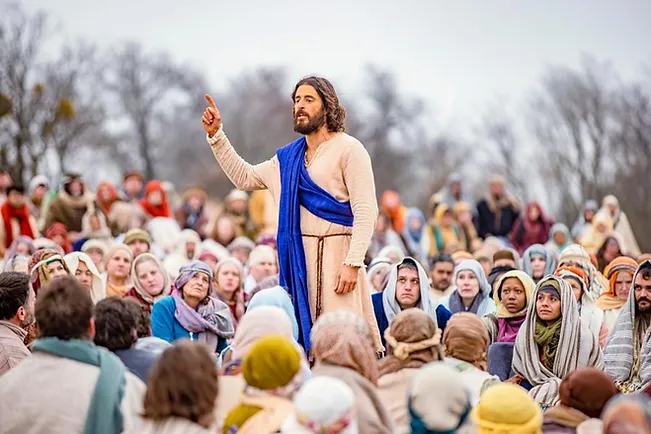The Sermon on the Mount
A scene from the television show “The Chosen” shows what the Sermon on the Mount could have looked like.
The sermon on the mount is considered by many to be the most important sermon ever delivered. It spans three chapters, transcribed by the apostle Matthew, and provides the reader with insight that we don’t take seriously in the modern age. The insight that, if followed, would lead to a world that was much better for all of the people in it.
The sermon begins with the Beatitudes (Matthew 5:1-11), which are blessings Jesus gives to groups of people.
Blessed are the poor in spirit: Those who recognize the guilt caused by their sin and turn to Jesus Christ for forgiveness, the kingdom of heaven is theirs.
Blessed are those who mourn: The people who mourn loss will be comforted by the reminder of the things that are to come.
Blessed are the meek: People often associate meek with the word weak. However, to be meek in a Biblical sense is to submit to the authority of God, and if you do this, you will inherit the new Earth (Revelation 21:1).
Blessed are those who hunger and thirst for righteousness: Those who seek out righteousness in Christ will be satisfied, as his righteousness is infinite and incomprehensible.
Blessed are the merciful: Those who are merciful to others will receive God’s mercy in their own lives.
Blessed are the pure in heart: Those who have received a new and pure heart within them (Isaiah 51:21) will see God in heaven.
Blessed are the peacemakers: Those who make peace in a world full of chaos will be adopted into the family of God (John 1:12).
Blessed are those who are persecuted for righteousness sake: Those who are persecuted in the name of Jesus Christ will inherit the kingdom of God.
What follows the beatitudes are proclamations that challenged the beliefs of both the Jewish people in the time of Christ and the beliefs of people in modernity. The first proclamation challenges the idea that the Messiah or Christ would come and the law of Moses would become obsolete. Christ refutes that idea, saying, “Do not think that I have come to abolish the Law or the Prophets; I have not come to abolish them but to fulfill them” (Matthew 5:17). This theme of a true fulfillment of the law shapes the rest of the statements Jesus would make.
Anger and Murder: Murder is wrong, a belief that goes unchallenged, except by complete moral relativism. The sixth commandment states that “You shall not murder” (Exodus 20:15 ESV), which is easy enough to understand. However, Christ states that anyone angry with his brother (without cause) is liable to judgment (Matthew 5:22). Christ demonstrates God’s true intention when he wrote the sixth commandment. Murder is borne out of anger; because of this, when someone is angry at another unjustly, he is guilty of breaking God’s holy law.
Lust and Adultery: Similarly to his proclamations about murder, Christ also seeks to make clear the meaning of the seventh commandment, “You shall not commit adultery” (Exodus 20:14). Rather than only relating to the unfaithfulness of a spouse, this verse can apply to anyone, married or unmarried. Christ states that anyone who looks at someone with lustful intent has already committed adultery in their own heart (Matthew 5:28). He then uses the (somewhat gory) imagery of gouging out your own eyes and slicing off your own hands to prevent yourself from lust to show that lust is serious in the eyes of God and that we must do whatever possible to remove it from ourselves.
In modernity, lust is considered to be an everyday occurrence. It’s natural. It can’t be helped. The direct opposite of what Christ says. Lust, whether it stays in the heart or is acted out, is never fulfilling to anyone. It leaves a person empty, as they still have no ultimate purpose, but instead, they live to fulfill their desire.
Divorce: The law of Moses allowed for men to divorce their wives, but Christ tells them that only under dire circumstances, such as adultery, should a husband and wife be divorced.
50% of marriages in America end in divorce. Because marriages are not founded on godly values and absolute commitment, they end in a situation that is not ideal for the wife, husband, or (possibly) children. Policies like no-fault divorce only make it much easier for a marriage to be ended rather than counseling to be sought.
Swearing: It was said to the Jews that they should not swear falsely and carry out the oaths they make, but Christ tells the Jews not to swear and make oaths and that their word (yes or no) should suffice. History often repeats itself, and today we find people disregarding this saying and opting for useless attempts to further their credibility. If someone swears to God, it does nothing but go against the word of God.
Vengeance and Retaliation: The absolute weight of these verses is often overlooked. To start, Christ tells people that “if anyone slaps you on the right cheek, turn to him the other also” (Matthew 5:38). Israel was a right-handed culture, so when Christ says the person was struck on the right cheek, he is saying that the person was backhanded (obviously even more disrespectful). He also says that if anyone asks for your tunic, to give them your coat as well and if anyone asks you to travel with them one mile, to go two, and to give to those who ask from you.
“Forgiving and forgetting” is easier said than done. To forgive someone who just backhanded you is even harder. Not retaliating may be the hardest part. But since it is the example that Christ sets for us, we must strive to live up to that example.
Love of Neighbor: This is the most well-known part of the sermon on the mount, and for a good reason. The Israelites were told by their Rabbis and teachers to “Love their neighbor and hate their enemy,” but Christ tells people to love their enemies and pray for those who persecute them (a revolutionary idea, even today).
If people only love the people who love them back, they are no better than a tax collector (tax collectors were seen as traitors, any modern example of a “bad person” works) because even someone like a tax collector loves those who love them.
Loving those who hate you and treating them with respect even when they don’t treat you with respect, may be one of the hardest commands to follow. Why wouldn’t you hate those who hate you? Why would you pray for someone who wishes nothing but the worst for you? If we only love those who love us, and pray for those who pray for us, we are no better than anyone else who does not know Christ.
Good deeds in public
The Pharisees and Sadducees were known for their public prayers, tithing, and giving to the poor. Christ rebukes those who do these things in public for attention, saying,” When you give, let your right hand not know what your right hand is doing, that your giving may be in secret. And your father who sees in secret [God] will reward you(Matthew 6:4).” and “When you pray, go into your room and pray to your father who is in secret(Matthew 6:6)”.
The only reason that some people do good deeds is for the attention they get from others. We must not fall into this trap. We shouldn’t even congratulate ourselves. If we are doing something that should be done (because it is commanded of us to love and care for our neighbor), why should we congratulate ourselves? We are not congratulated for doing our homework, as it is required of us by a teacher, just as taking care of our fellow man is expected of us by God.
Worldly Treasure
Christ tells us not to gather and focus on the “treasure” of the world (money, expensive things, etc.). These things are not permanent and are not something we can take with us when we die. Therefore, it is useless to focus on worldly treasures but on the treasures of heaven.
The Lamp of the Body
If what goes into the body is good and holy, the rest of the body will be good and holy. If what goes into the eye is evil and sinful, the rest of the body will be as well. Sin begins in the heart, but the eyes aid in the process depending on what you look at.
Two masters
A person cannot serve two masters at once. He will love and devote himself to one and despise the other. Christ uses the example of money, but it also applies to other things. People place many things over their devotion to God, whether they acknowledge it or not. When people focus primarily on a career, a partner, wealth, fame, or anything else, God is often tossed to the wayside. God should always be our main focus.
God’s care for man
We should not be anxious about our lives. What we wear, what we drink, or what we will eat. Birds do not worry about growing their food, yet they are fed. Are we humans not more important to God than a bird (Matthew 6:25-26)? So, we should seek God and his kingdom, and these things will come to us naturally. We must just have faith.
Worrying about our life will do us no good. As Christ says “do not be anxious about tomorrow, for tomorrow will be anxious for itself. Sufficient for the day is its own trouble (Matthew 6:34)”.
Righteous Judgment
People often assume that we aren’t to judge others at all, and these verses are taken out of context to prove this assumption. However, the content of the verses proves the opposite point. Christ tells people to “judge not, lest you be judged (Matthew 7:1)” meaning do not judge someone for something that they are doing unless you want to be judged for that thing. In other words, don’t be a hypocrite. We are to “take the log out of our own eye” so that we may “see clearly to take the speck out of your brother’s eye”. These verses are a condemnation of hypocrisy, not of judging others. We are to judge a “righteous” judgment (John 7:24).
The easy way
Christ tells us that easy is the way, and broad is the gate that leads to hell and destruction, but the gate is narrow, and the way is hard that leads to eternal life.
A person’s fruits
Christ gives a metaphor for trees and fruit. Those who are bad trees will produce rotten fruit, and those who are good trees will produce righteous fruit. People will claim to know God, but their fruit and works are absolutely evil. Everything these people do is against God’s words; if they do not repent, they will be cast into eternal fire.
Depart from me…
Perhaps the saddest (and scariest) verses in the whole Bible are these:
“Not everyone who says to me, ‘Lord, Lord,’ will enter the kingdom of heaven, but the one who does the will of my Father who is in heaven. On that day, many will say to me, ‘Lord, Lord, did we not prophesy in your name, cast out demons in your name, and do many mighty works in your name?’ And then will I declare to them, ‘I never knew you; depart from me, you workers of lawlessness.’
Christ, sticking to the theme of the previous tree/fruit metaphor, proclaims that during the final judgment, many who considered themselves righteous people, people who performed miracles, were never really saved to begin with.
Christ, The Rock
“The people who hear the words of Christ are like those who build their homes on a solid foundation. Floodwater and wind beat against the house, but it was left standing because it was built on a solid foundation (Matthew 7:24-25). But those who disregard the word of Christ are like a fool who builds their house on sand, and “the rain fell, and the floods came, and the winds blew and beat against that house, and it fell, and great was the fall of it (Matthew 7:26-27).”
Many lessons that Christ gives in this sermon can be applied to anyone’s life, Christian and non-Christan. However, if someone does not base their life, morals, and understanding of the word of God, their life [house] will ultimately crumble. Do not be like the fool. Turn away from your sin and towards Christ.

Chance Howard is a sophomore attending Lafayette, and a first-year writer for the Lafayette Times. Chance’s areas of expertise include religion and politics....











